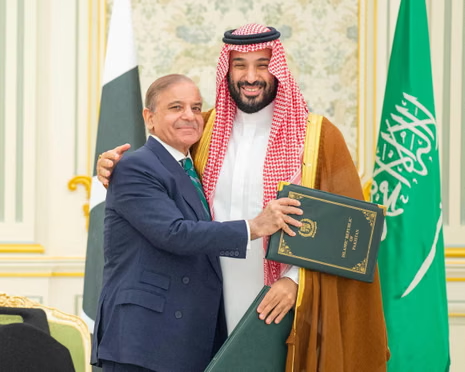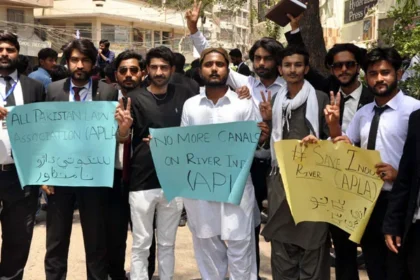Let’s talk about the new strategic pact between Pakistan and Saudi Arabia. We are not really going to talk about it, because nobody — and I mean nobody — actually knows what’s in it. It’s a hostage situation where both sides are pointing guns at each other. A geopolitical version of two people who really need a plus-one for a wedding and agree to go together, even though they know the other person will probably drink too much and start a fight.
Let’s get to know our stars:
Pakistan: The “Broke But Woke” Muscle
Pakistan’s desperation is an economic one. It is the friend who is a great, charming bodyguard but is now sleeping on your couch because he doesn’t have any money. He has the skills, the muscle, and a lot of guns in the trunk of his car, but he can’t afford to fill it up with gas to drive it.
Its pitch to Saudi Arabia is basically: “Look, bro… I’m loyal. I’ll fight your ghosts for you. My army is the second biggest Muslim army in the world! And I have this thing. In the basement. It’s huge. Very bright. You can’t see it. But it’s there. You know… D… for Deterrence. But… um… I need a little help. Just enough to pay my rent. And my food. And my bills. And maybe a small, interest-free loan the size of a mountain. It’s for jihad… but in a business way, you know.”
Saudi Arabia: The “Rich But Scared” Loner
Saudi Arabia’s desperation is one of existential dread. Don’t let the gold-plated front fool you. Saudi Arabia is desperately lonely, and its neighbourhood is a nightmare. Iran is its sworn enemy, Israel is… complicated, and its other Gulf buddies are fickle. The U.S. is a fair-weather friend who’s started looking at solar energy pamphlets.
Its pitch to Pakistan is: “My dear indebted friend, I have the geopolitical anxiety of a chihuahua in a thunderstorm. The Americans are acting weird, Iran is giving me the side-eye, and I need a friend who looks scary. You look scary. Let’s make a deal. You can stand behind me and flex. I’ll make your debt go away.”
This regime is so morally bankrupt that it would try to sell the very air in a room if it could. Now, with its endless supply of petrodollars, it is trying to buy its way onto the world stage. This is the same kingdom that promotes a sanitised, fossil-fuelled version of Islam globally, even as its own foundations are undermined by human rights abuses and glaring hypocrisy; it pretends to be a protector of the Muslim world while its princes and investment funds indulge in champagne in London and court Israeli tech moguls, oblivious to the irony.
Let’s now observe the reactions from the established order, a masterclass in geopolitical buffoonery:
The U.S.:
Washington, D.C., the Jilted Superpower, is going through the geopolitical version of being left on read. You can picture the State Department’s frantic texts: “Hey guys, I saw the news… cool pact.” Are we still going to have lunch next week? There is a lot of silence coming from Riyadh. The U.S. thought its security guarantees were the only ones that mattered, but it has just found out that they have been replaced by an open-source model.
India:
The Sputtering Hegemonic Aspirant New Delhi’s answer can be summed up as a long, high-pitched scream of confusion. One minute, Modi’s government is making strategic partnerships with Washington. The next minute, its main regional rival is suddenly the chief security guard for its main energy supplier. It’s a terrible mistake in the matrix. India’s foreign policy is mostly about pointing at Pakistan and yelling “terrorism!” on the world stage. Now, though, it has to deal with the fact that Pakistan is now inextricably linked to the Arab world that India has been trying so hard to win over. It’s a tasty problem for them: if they criticise the deal, they offend Saudi Arabia. If you don’t say anything, you admit that your own plan has failed. They are, quite literally, lost for words.
Israel:
The Unwanted Troublemaker Israel, which often acts like a guest at a party with a flamethrower, is now facing a new reality. It used a strategy of planned, targeted attacks on its enemies that depended on a predictable and broken response. The idea that a successful attack on one target would automatically set off a response from a nuclear-armed country hundreds of miles away was not in the playbook. The pact is a blanket thrown over their favourite game of fire. Netanyahu’s government is now left to wonder if its next provocative act might just bounce back with unimaginable force. For the first time, their aggression has a tangible, terrifying return address.
The Pact Itself: A Work of Art in Shared Delusion
So, Pakistan and Saudi Arabia signed something. A beautiful, vague, and wonderfully unclear thing that says, “An attack on one is an attack on both.” An “attack” could mean anything from a full-scale invasion to someone scratching the foreign minister’s luxury sedan.
- For Saudi Arabia, it means, “If my oil fields get bombed, you have to at least make my army’s Instagram look really threatening. Plausible deniability. Performance-based support.”
- For Pakistan, it means, “If my honour is slighted in a cross-border tweet, you will fund a new six-lane motorway. Mutual respect. Scalable responses.”
The genius of the pact is its weaponised ambiguity. It’s a blank cheque with a Rorschach test on it. The Saudis see a loyal security guard with a big stick when they look at it. Pakistan sees it as a kind of sugar daddy with an endless supply of money. They’ve promised to be there for each other, with the unspoken addendum, “…within reason, and subject to review based on current mood and global oil prices.”
So let’s stop acting like this is the new NATO. No, it’s not. It’s the prenup with the most at stake in the world, but it’s not clear what it means. It’s a promise to be each other’s ride-or-die, so long as the ride is comfortable and death is highly unlikely.
They’ve entered a sacred bond of mutually assured… interpretation. May God have mercy on both of them.














